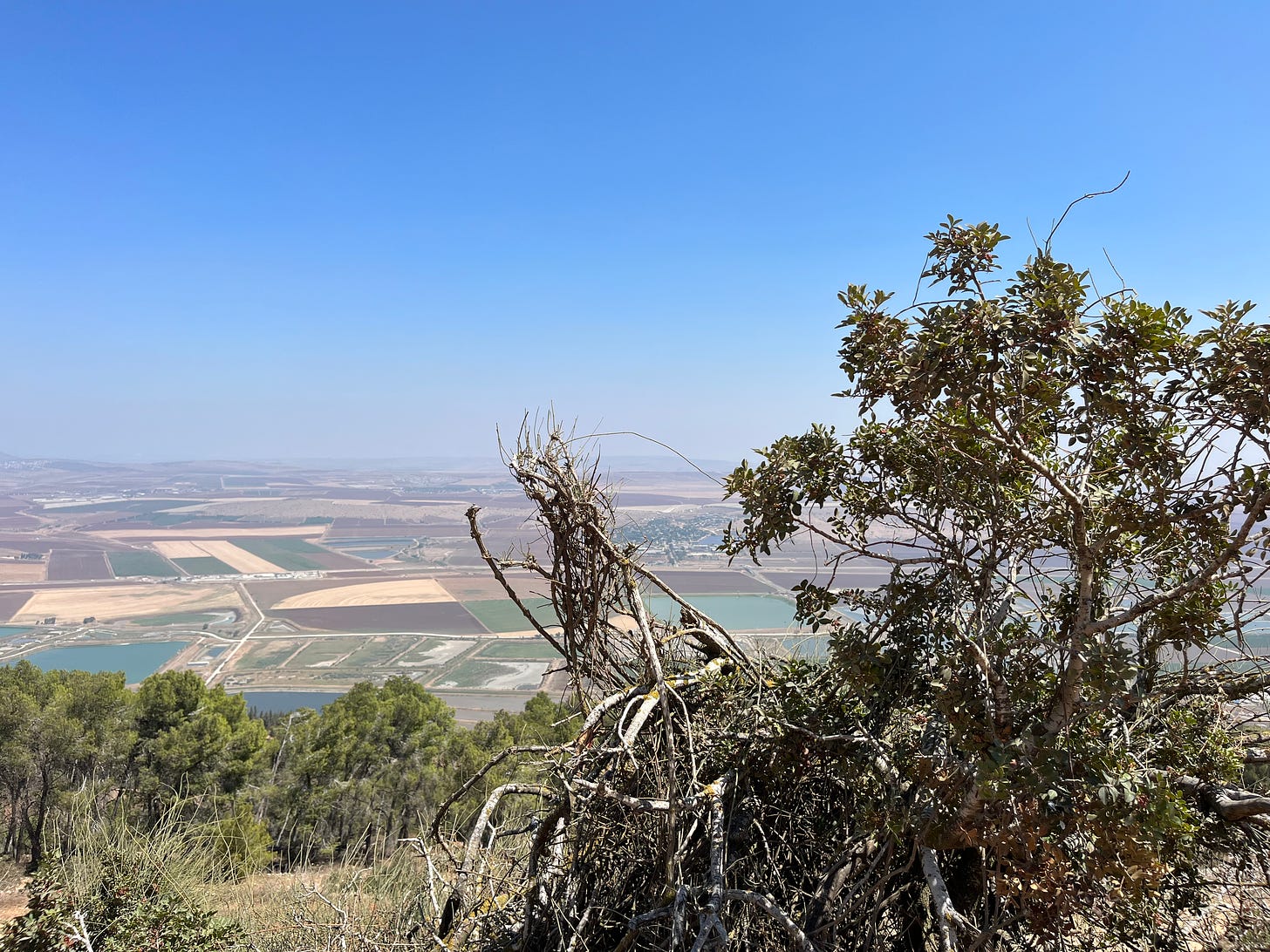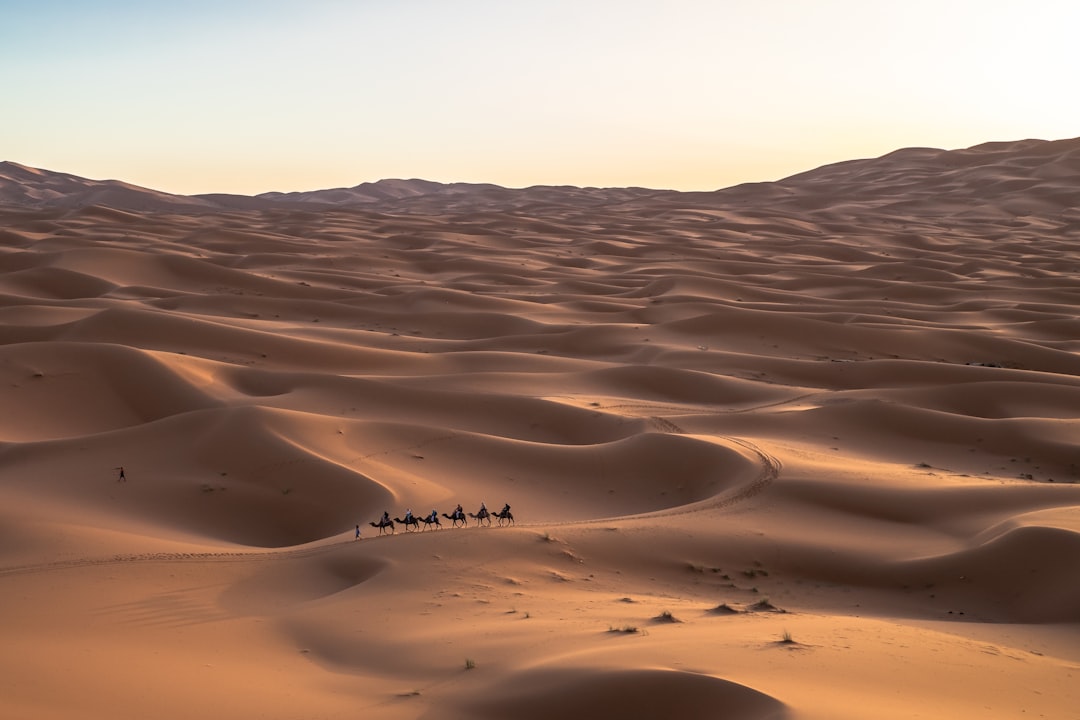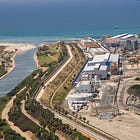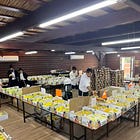"The Land is Very, Very Good"
This isn't a random pogrom in Poland: Israel the People are suffering in Israel the Land. Now is the time to cherish the Land for which we live and yearn.
The word Israel means two things:
The People of Israel, known as Jews. This name was given to Yaakov (Jacob) by the angel he battled: “Your name will no longer be Yaakov but Yisroel (Israel), because you fought (“sareisa”) with angels and men and won.”1 Yaakov’s descendants adopted this name and became the Nation of Israel.
The Land of Israel, whose borders very roughly correspond with the modern State of Israel. Although this title is uncommon in Scripture (which usually refers to “the precious land,” “the good land, and so on), this is the standard name in all Rabbinic sources.
The relationship between these two things is the story of the Jewish people.
The Torah’s Arc of History
Judaism’s founding document, the five books of Moshe’s (Moses) Torah, is built around the narrative of our birth and growth. The arc of its history bends in one direction: the People of Israel reaching, inheriting, and living in the Land of Israel.
God’s first words to our first forefather were: “Go to the Land that I will show you.” Although God also promised Avraham, Yitzchok, and Yaakov (Abraham, Isaac, and Jacob) a nation a numerous as the stars and sands, the bulk of His communications with them were about the Land their children were destined to inherit.2
Moving on to the second half of Bereishis (Genesis) and the first half of Shemos [Exodus], the Torah tells how Yaakov’s offspring multiplied in Egypt to become a nation of slaves, and then the dramatic Exodus which freed them.
In one of medieval Jewish scholarship’s most famous passages, the Ramban (Nachmanides)3 explains why a large percentage of Jewish rituals and laws are dedicated to remembering the redemption from Egypt. Whenever we observe Jewish holidays, recite kiddush on Shabbos and holidays, nail a mezuzah on our doors, or put on tzitzis, we’re accepting that God created the world and justly manages all its affairs - as was revealed when He redeemed his beloved nation and punished their tormentors.
But this seminal event didn’t free us and leave us to be God’s nation in Egypt. He didn’t even change the tables and make us the masters of Egypt. He pulled us out of there, and told us to never go back. The heart of the redemption was the Exodus, which is an accurate translation of the Hebrew term repeated scores of time in the Torah: yetzias mitzraim.
But why did we need to leave Egypt? And why is the leaving the core of the redemption story?
The Torah answers the question:
He took us out of there [Egypt], in order to bring us the Land that He swore to our fathers [to give us].4
The point of it all was to return to Israel, the land that God had promised to our forefathers. There is no birth, growth, and life of Israel the People without Israel the Land.
To learn more about the Exodus from Egypt heading toward Israel, and the differences between the Egypt and Israel, check out these two articles:
Sadly it feels like months ago, but only the week before last, on Chol Hamoed Sukkos, over 200 foragers (spread out in 5 walks) came along to taste the fruits of Natural Israel and learn the stories of the Land. Everyone had an unforgettable, enjoyable, and valuable experience of the Festival of Foraging.
When the time is right, we will forage again!
(For more details about Foraging Walks in Natural Israel, check out healthyjew.org.
The Tragedies of Israel
The root of all our nation’s sufferings - two exiles, the Inqusition, the Holocaust, pogroms everywhere, and our current tragedy - is our distance from the Land and its spiritual values.
Another large chunk of the Torah is devoted to telling that story: when Moshe’s (Moses) failed spies stoked fear of the Canaanites, Israel the Nation spent the night of the ninth of Av crying to return to Egypt. God’s immediate response was to keep them 40 years in the desert until a new generation was born, and the long-term repercussions are millennia of painful exile and torment. On that day, many years later, both Temples were destroyed.
In King David’s words5:
They were disgusted with the Cherished Land; they didn’t believe His word. He lifted His hand on them, for them to fall in the desert, and for their descendants to fall in the nations, and be scattered among the lands.
The People and the Land Today
These observations aren’t controversial, and have nothing to do with religious Jews’ various opinions about secular political Zionism. You can believe the modern State of Israel is is the harbinger of Mashiach (Messiah), the worst desecration of God’s name in history, or anything in between, but the basic fact remains: there is no story of Israel the People that’s disconnected from Israel the Land.
Following three thousand years of turbulent Jewish history, the current unfolding catastrophe isn’t only an attack on Israel the People, but also on Israel the Land. This is not just another pogrom in Poland on some random Jews. (In truth, those too were a direct result of our spiritual and physical distance from the Land.)
Yet the horrific stories and images coming out from Israel don’t portray the Land in which its People are suffering and dying. They only show depraved violence of people on people. Even the tales of courage and hope are about people.
To find meaning in all the madness, we must look deeply at the Land that is its People’s destination, to appreciate Natural Israel’s spiritual values, beauty, and messages of healthy Jewish living. Beneath the blood and suffering of its children, Israel the Land calls out for us to cherish it.
The Healthy Jew’s Second Front
Many people, far more capable than I, are hard at work telling the current stories of Israel the People: the anguish, anger, fear, faith and fortitude. After consulting with my rabbi, it seems that my small contribution is to tell the stories of Israel the Land.
Therefore, in addition to our regular Wednesday article about healthy Jewish living, The Healthy Jew will, with God’s help, publish every Sunday about Natural Israel. We are opening a second front.
If only for a few moments each week, I invite you to exchange the images of pain and fear with pictures of purpose and hope. Moshe’s (Moses) failed spies cried that Israel is a “land that eats its inhabitants”; let’s join the response of Yehoshua (Joshua) and Calev (Caleb): “the land is very, very good!”
Because of safety concerns, and sensitivity to our nation’s mourning, I won’t now be traipsing across Israel’s landscapes and posting lengthy travelogues. Expect shorter insights, images, and clips. The details will develop over time.
Clear out a little bit of space in your mind, heart, and email inbox for the Land of Israel. If you care to, share The Healthy Jew with your friends and followers, so that more people may join the war effort.
Bereishis (Genesis) 32:29
For example, the entire message of the bris bein habesarim (a complex covenant between God and Avraham, recounted in Bereishis 15) was that after four generations of exile Avraham’s descendants will inherit Israel.
Shemos (Exodus) 13:16
Devarim (Deuteronomy) 6:23. See also Ramban to Shemos (Exodus) 3:8.
Tehillim (Psalms) 106






